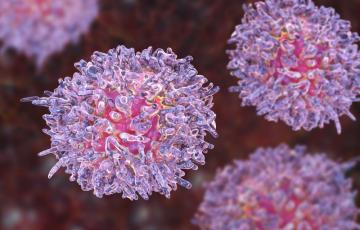Search Results
Just Diagnosed? LLS Can Help
Finding out you have blood cancer can bring on a whirlwind of emotions and a plethora of questions. No one expects to get such a diagnosis and there isn’t anything you can do to prepare.
Regardless of how you came to your diagnosis, most people report not having absorbed a lot of information after hearing the word “cancer." The vocabulary may seem like a foreign language, and the need for support can be tremendous.
Against All Odds, Eevie Turns 1!
A first birthday is always a big occasion, but for Eevie, it's taken on a whole new meaning. She was born with a rare leukemia that gives her a 17 percent chance of surviving to age 2. Even her parents weren't sure she would make it this far. "We didn't think she would still be here. The odds were never in her favor," said her mom, Brynne. Eevie was born with congenital acute lymphoblastic leukemia (ALL), an extremely rare condition affecting 1 in 5 million newborns.
Understanding Leukemia in Children with Down Syndrome to Develop Better Therapies
This Specialized Center of Research is focused on identifying the contributions of chromosome 21, which is present in three copies in individuals with Down syndrome (DS), to acute leukemia. Children with DS are at a 20-fold increased risk of leukemia compared to the overall pediatric population and frequently have other health issues that complicate leukemia treatment.Mechanisms of oncogenic transcription in NPM1-mutant myeloid leukemia
NPM1-mutated leukemia is the most common AML in adult and characterized by upregulations of HOXA/B genes and MEIS1. Given the importance of oncogenic transcriptional program, I will determine regulatory molecules that cooperate with mutant NPM1 on chromatin by combining CRISPR/Cas9 screening approach in an innovative model system of endogenous transcription reporters with proteomics approach. This will facilitate identification of novel therapeutic targets specific for NPM1-mutated AML.Discovering the function and targeting dysregulated nuclear condensates in myeloid leukemia
Although molecular targeted therapy has dramatically changed how we treat cancer, the treatment for acute myeloid leukemia (AML) remains focused on the use of cytotoxic drugs with many patients eventually relapsing with their disease. Our studies have a uncovered a new nuclear structure that is dysregulated in myeloid leukemia. This proposal studies the identity and function of this nuclear body in human AML and strives to identify novel therapeutic strategies and targets in leukemia.New Targeted Therapies for Pediatric Acute Myeloid Leukemia
Our research focuses on the preclinical evaluation of new targeted therapies for high-risk subtypes of childhood AML. We are deploying screening approaches to delete each gene, one-by-one, to identify genes whose deletion leads to death of the leukemia cells. We will evaluate drugs developed against these targets in state-of-the-art models of pediatric AML. Our goal is to translate the most promising findings to clinical trials for children with these very poor outcome subsets of AML.
Moving Forward: 4 Young Blood Cancer Survivors Look Ahead
Blood cancer survivors have a unique path ahead of them—and that can feel challenging.
Questions come up: Does treatment mean I have to pause everything? Do I tell my friends or coworkers (and how)? With my medical bills, how can I afford the education I want?
Targeting Leukemia Stem Cells with the Novel Antibody Drug Conjugate
To improve the cure rate of patients suffering from acute myeloid leukemia (AML), our study aims to target resistant leukemia stem cells by developing an 'antibody-drug conjugate' (ADC) against CD99, a protein expressed on these cells. Initial tests of two ADC versions have shown promise in combating AML. Our next steps involve refining the anti-CD99 antibody, identifying the optimal drug for conjugation, and testing the ADC on patient-derived leukemia models.Looking Ahead: LLS Panel Highlights Trends and Advances
The Leukemia & Lymphoma Society recently brought together a world-renowned panel of thought leaders to discuss the latest advances and insights into blood cancer research and treatment, drug costs and patient access, and patient advocacy and policy.
“There’s never a good time to get cancer but this is a phenomenal time to be fighting it,” said Louis J. DeGennaro, president and CEO of The Leukemia & Lymphoma Society (LLS).
Remembering Cancer with a Tattoo, New Career and Anniversary Party
In Jon Christoffersen’s house, important occasions - such as the end of chemotherapy - are worthy of great celebration. First it was a tattoo to mark the beginning and end of his treatment, and now, on his 10-year anniversary of being cancer free, it’s time to party.
Molecular basis and new therapeutic strategies in lineage ambiguous leukemia
Lineage-ambiguous leukemias are high-risk blood cancers with unclear biologic basis and suboptimal treatment options. Here, I will identify the cell of origin of lineage ambiguous leukemia and investigate new therapeutic strategies through in vitro and in vivo experimental modeling approaches and preclinical drug studies in patient-derived xenografts. These studies will clarify the cellular and molecular alterations driving lineage ambiguity and advance a new, rational therapeutic approach.Understanding the role of Metabolic Regulator SIRT5 in Acute Lymphoblastic Leukemia
SIRT5 is a master regulator of central energy metabolism. The survival and growth of Acute Myeloid Leukemia (AML) cells depend on SIRT5. I will employ genetic SIRT5 disruption and small molecule inhibitors to target SIRT5 in Acute Lymphoblastic Leukemia (ALL) cells and primary samples. This study aims to 1) determine the effects of SIRT5 inhibition on ALL in vitro and in vivo, and 2) identify SIRT5-regulated pathways and mechanisms underlying SIRT5 dependency in T-ALL.Imatinib mesylate
Imatinib mesylate is FDA approved to treat
Cytarabine
Cytarabine is FDA approved to prevent and treat leukemia that has spread to the meninges (the three membranes that cover the brain and spinal cord). It is also FDA approved for use with other drugs to treat acute myeloid leukemia, acute lymphoblastic leukemia and chronic myeloid leukemia. This medicine may cause a temporary loss of hair in some people. After treatment with cytarabine has ended, normal hair growth should return.
Liposomal cytarabine (DepoCyt®) is given by intrathecal injection. It is FDA approved to treat lymphoma that has spread to the meninges.

FDA Approves New Maintenance Treatment for AML
Some promising news to kick off Blood Cancer Awareness Month – on September 1, 2020, the U.S. Food and Drug Administration approved a new oral maintenance treatment for certain adult patients with acute myeloid leukemia (AML).
CC-486 (Onureg®) is now approved for the continued treatment of adult patients with AML who achieved first complete remission (CR) or CR with incomplete blood count recovery (Cri) following intensive induction chemotherapy and who are not able to undergo intensive curative therapy, such as hematopoietic stem cell transplant.
Targeting AML
Not for lack of trying, we’ve seen very little progress over the past 40 years in treating acute myeloid leukemia (AML), an aggressive and deadly blood cancer. But we’re finally starting to see the needle move and The Leukemia & Lymphoma Society (LLS) is playing a leading role in going on the offensive against the disease.
Panelists Discuss the AML Patient Experience
What is AML? What research is underway? And what resources are available to patients?
The Leukemia & Lymphoma Society recently joined up with Patient Power and the MDS Alliance to host an AML Awareness Day and answer those questions.
The April 21 webcast was moderated by Carol Preston, host of Patient Power, an online portal offering cancer information for both patients and professionals. Preston is also a chronic lymphocytic leukemia (CLL) survivor.
T cell acute lymphoblastic leukemia accumulation in the central nervous system
T cell acute lymphoblastic leukemia (T-ALL) has a strong tendency to infiltrate the central nervous system (CNS). The goal is hope to develop strategies to treat CNS disease in T-ALL with less neurotoxicity and more efficacy than current chemotherapy.Blinatumomab
Blinatumomab is FDA approved for the treatment of adult and pediatric patients one month and older with: